The NVBMB prize is handed out since 1981 to give recognition to the work of a highly talented young independent biochemist or molecular biologist working in the Netherlands. The prize amounts to €2,000 and includes additional funds to organize a one-day scientific meeting on a topic that meets the field of interest of the candidate. An overview of previous winners is listed on the right.
Nominees for the NVBMB prize need to have at least two years of postdoctoral experience with preferable experience abroad. Nominations are judged on scientific quality, publication track record, productivity, creativity, and international experience and visibility.
Procedure
Nominations for the NVBMB prize 2026 should be sent by email to the secretary of the NVBMB, prof. dr. Arjan Kortholt (nvbmb@kncv.nl) before December 31st, 2025. Nominations can be made by any academic staff member working at a Dutch research institute. Self-nominations are not accepted. Nominations should include a brief CV, publication list, and a brief description of the scientific achievements (max one page).
Nominations are judged by an independent jury on the criteria mentioned above. The selected winner will be informed in the first quarter of the new year. The winner is expected to organize a one-day meeting in the fall of that year on the topic of his or her interest.
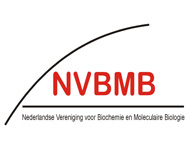
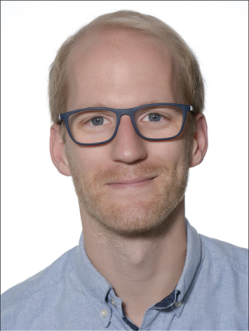
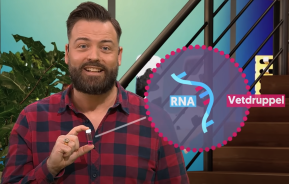
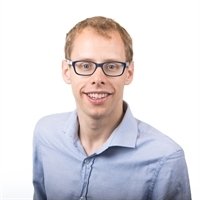 Dr. Nico Claassens obtained his PhD in 2017 on the topic of membrane protein production using innovative genetic designs. He then moved to Potsdam, Germany for postdoctoral studies at the Systems and Synthetic Metabolism group of the Max Planck Institute for Molecular Plant Physiology, supported by a NWO Rubicon fellowship. During this time, he made a major breakthrough by successfully implementing a synthetic pathway for the fixation of the one-carbon substrates CO2 and formate in a bacterium, for which he used his expertise in genetic engineered obtained during his PhD studies. In 2019, Dr. Claassens was awarded an NWO Veni grant to return to Wageningen University, where he now has a position as assistant professor in Microbial Synthetic Metabolism.
Dr. Nico Claassens obtained his PhD in 2017 on the topic of membrane protein production using innovative genetic designs. He then moved to Potsdam, Germany for postdoctoral studies at the Systems and Synthetic Metabolism group of the Max Planck Institute for Molecular Plant Physiology, supported by a NWO Rubicon fellowship. During this time, he made a major breakthrough by successfully implementing a synthetic pathway for the fixation of the one-carbon substrates CO2 and formate in a bacterium, for which he used his expertise in genetic engineered obtained during his PhD studies. In 2019, Dr. Claassens was awarded an NWO Veni grant to return to Wageningen University, where he now has a position as assistant professor in Microbial Synthetic Metabolism.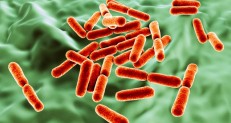 The
The 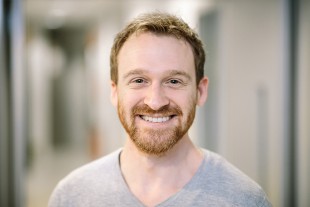 Dr. Thom Sharp obtained his PhD degree at the University of Bristol, UK, where he used cryoEM to study the structure of peptide fibres. During this time, he also worked on the development of chemical probes that can be used for Correlative Light Electron Microscopy (CLEM). As a postdoc he first worked at the University of Oxford, UK, where he started to use nano-engineering methods to address structural biology problems. He designed and analyzed DNA-templated protein arrays which could be used for high-throughput protein structure determination by single-particle cryoEM methods. For a second postdoctoral period he moved to the LUMC where he initiated his work on the innate immune system. He focused on the use of electron cryo tomography and subtomogram averaging to determine structures of macromolecular protein complexes of the immune system. Since 2018, Dr Thom Sharp leads the
Dr. Thom Sharp obtained his PhD degree at the University of Bristol, UK, where he used cryoEM to study the structure of peptide fibres. During this time, he also worked on the development of chemical probes that can be used for Correlative Light Electron Microscopy (CLEM). As a postdoc he first worked at the University of Oxford, UK, where he started to use nano-engineering methods to address structural biology problems. He designed and analyzed DNA-templated protein arrays which could be used for high-throughput protein structure determination by single-particle cryoEM methods. For a second postdoctoral period he moved to the LUMC where he initiated his work on the innate immune system. He focused on the use of electron cryo tomography and subtomogram averaging to determine structures of macromolecular protein complexes of the immune system. Since 2018, Dr Thom Sharp leads the 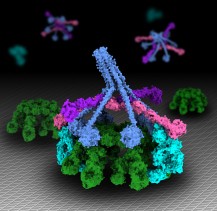 Supported by ERC-starting and NWO-vidi grants, Dr. Sharp now combines his acquired expertise in an impressive range of methodologies to engineer complex protein assemblies, with the aim to understand the ultrastructure of the human innate immune system, and exploit this knowledge to develop strategies for activation, for instance to attack cancer cells or pathogens. The protein structures are built on engineered nanometer-scale scaffolds of DNA assemblies. In this way the higher order protein assemblies have predictable ultrastructures. Dr Sharp uses Electron cryo tomography to directly visualize these engineered structures and capture complement activation in the act. Besides this in vitro structural work, Dr Sharp also explores ways to combine super-resolution light microscopy with cryoEM to perform structural biology on individual proteins within cells.
Supported by ERC-starting and NWO-vidi grants, Dr. Sharp now combines his acquired expertise in an impressive range of methodologies to engineer complex protein assemblies, with the aim to understand the ultrastructure of the human innate immune system, and exploit this knowledge to develop strategies for activation, for instance to attack cancer cells or pathogens. The protein structures are built on engineered nanometer-scale scaffolds of DNA assemblies. In this way the higher order protein assemblies have predictable ultrastructures. Dr Sharp uses Electron cryo tomography to directly visualize these engineered structures and capture complement activation in the act. Besides this in vitro structural work, Dr Sharp also explores ways to combine super-resolution light microscopy with cryoEM to perform structural biology on individual proteins within cells.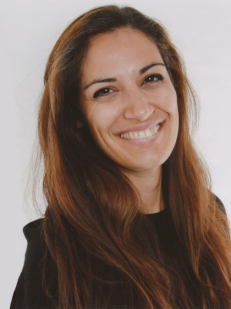
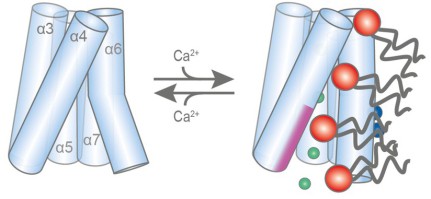
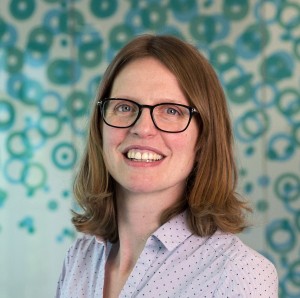
 The 2018 NVBMB prize has been awarded to Dr. Tineke Lenstra of the Netherlands Cancer Institute in Amsterdam. Dr. Lenstra received a personal TOPtalent grant from NWO in 2008 to pursue her PhD studies at the University of Utrecht. She obtained her PhD degree (cum laude) in 2012, and then moved to The National Institutes of Health in the US for postdoctoral research funded by prestigious personal grants from the European Molecular Biology Organization (EMBO long term fellowship) and the Koningin Wilhelmina Fonds (KWF). She returned to The Netherlands in 2016 when she was appointed as a junior group leader in the Netherlands Cancer Institute.
The 2018 NVBMB prize has been awarded to Dr. Tineke Lenstra of the Netherlands Cancer Institute in Amsterdam. Dr. Lenstra received a personal TOPtalent grant from NWO in 2008 to pursue her PhD studies at the University of Utrecht. She obtained her PhD degree (cum laude) in 2012, and then moved to The National Institutes of Health in the US for postdoctoral research funded by prestigious personal grants from the European Molecular Biology Organization (EMBO long term fellowship) and the Koningin Wilhelmina Fonds (KWF). She returned to The Netherlands in 2016 when she was appointed as a junior group leader in the Netherlands Cancer Institute.
